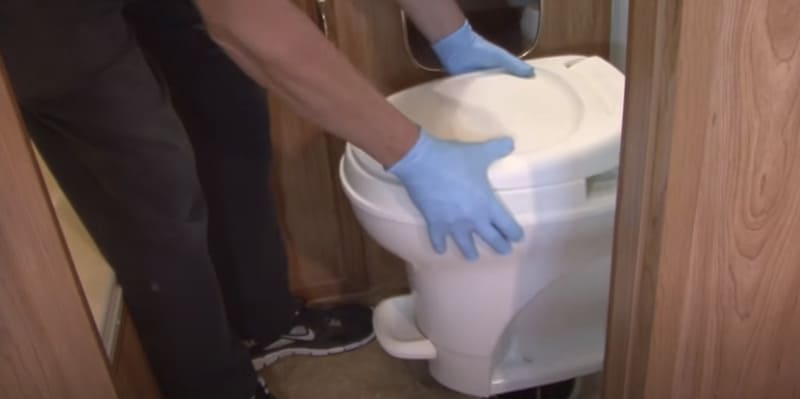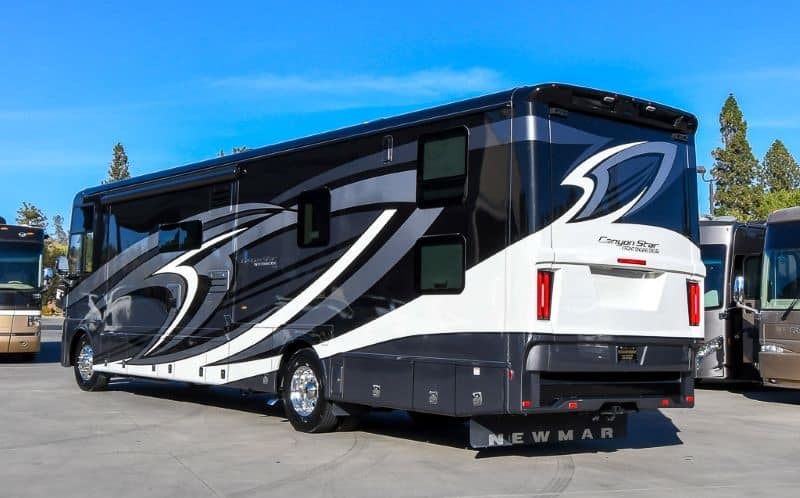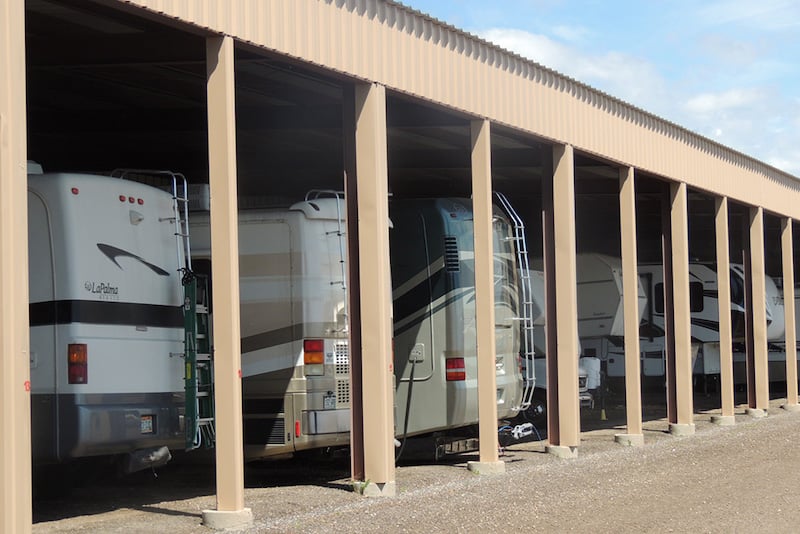There are some who believe that it’s possible to replace an RV toilet with a regular toilet. It may seem like an easy DIY project, but don’t be fooled.
There’s much to consider when choosing a replacement toilet for your RV. Remember that just because something can be done doesn’t mean it should be done.
We’ll look at the logistics of replacing your RV toilet and the many choices on the market. Come along with us as we explore all the options for swapping out that porcelain, or in this case plastic, throne.
Can You Replace an RV Toilet with a Regular Toilet?
While you technically might be able to swap your RV toilet for a regular toilet, you shouldn’t. Even if a regular toilet fits, it won’t work as reliably as a toilet intended for RVs. There are many reasons, so let’s look at the top seven.
7 Reasons a Regular Toilet Won’t Work in Your RV
1. The Weight
Regular household toilets are typically made of porcelain. Porcelain is significantly heavier than the plastic that comprises most RV toilets. As we all know, additional weight is not your friend when RVing.
When remodeling your RV, keeping a close tab on weight is important. Even seemingly little changes, like swapping out a toilet, can increase your Unloaded Vehicle Weight (UVW) in a significant way.
2. More Complicated Plumbing
Regular toilets rely on a more complicated plumbing system than RV toilets. The holding tanks, water traps, and flushing mechanisms can complicate the water flow of a regular toilet in an RV. A residential commode may fit and look nicer than an RV toilet, but it’s not worth the hassle.
3. More Expensive
Replacing your RV toilet with a regular toilet can be tempting, but you need to look at the cost of the toilet itself. After all, an RV toilet and a run-of-the-mill household toilet can have similar price tags. However, there are other cost factors that you need to consider.
We’ve already mentioned that regular toilets have more complicated plumbing systems. You’ll also need additional hardware to secure a regular toilet to an RV.
The standard two-bolt RV toilet installation just won’t cut it for a heavier porcelain toilet. Budget for the cost of a plumber just in case, because more complicated plumbing and the installation often mean you’ll need a professional for this project.
4. Not Road-Ready
If you replace an RV toilet with a residential commode, you’ll have travel problems even when a professional plumber installs it. Residential toilets aren’t made for the trials of the road. The molded porcelain will crack, creating a mess no one wants to clean up.
The water in a residential toilet is covered by a porcelain lid secured only by its weight. Imagine arriving at your destination only to discover that the toilet lid has fallen off and shattered, allowing water to slosh everywhere.
RV porcelain toilets are made differently. They are sturdier yet lighter than their residential counterparts. Their thick construction can handle the bumps and bruises of on-road RV travel without adding too much weight to the motorhome or travel trailer.
5. Too Much Water Use
Regular toilets are also a poor choice because they use too much water to be compatible with RV living. Water usage may not be a huge concern if your RV is parked on a full hookup site. But if you’re boondocking, replacing your RV toilet with a regular one will use too much water.
The holding tank on a regular toilet is also a recipe for disaster in RV travel. On average, a home toilet tank has about half a gallon of water in it at all times.
A regular toilet can use an RVer’s entire daily allotment of water in just a few flushes! Not only that, but the freshwater tank will require refilling more frequently. Likewise, the black tank will need to be emptied more often; yuck!
6. Too Smelly
Speaking of toilet yuckiness, regular toilets installed in RVs often smell. That’s because they rely on water in a trap to prevent sewer gases from traveling up and out.
Water is very difficult to keep in the trap of a toilet that’s constantly being jostled and moved. In contrast, RV toilets have trap doors that open and close to drop waste directly into the black tank.
The design of an RV toilet is much more suited to keeping the smells of a black water tank at bay.
7. Far More Maintenance
The more complicated plumbing of regular toilets makes everything from smell prevention to regular maintenance more difficult. Replacing an RV toilet with a regular one is a bit like trying to fit a square peg in a round hole. You might be able to do it, but only with a lot of effort and upkeep.
Will a Regular Toilet Seat Fit on an RV Toilet?
By now, you might be wondering if you can simply replace your RV toilet seat rather than the whole toilet. If you want a more comfortable commode, replacing just the toilet seat can be a great option, but it isn’t always possible.
RV toilets aren’t standard. Some are larger or smaller than others. You’ll need to measure the width, length, and distance between bolts to determine if a standard toilet seat will fit. Once you have these measurements, you can begin your search for the perfect RV toilet seat replacement.
Keep in mind that there’s a reason that RVs don’t come standard with residential seats. Many of these materials are fragile, and you don’t want your toilet seat to crack or break as you travel down the road. If you want to upgrade, wood or plastic are comfortable and sturdy options.
The 4 Best RV-Friendly Residential Toilet Equivalents
1. Dometic 320 Series Standard Height R Toilet
The Dometic 320 Series is a great option when upgrading/replacing your standard RV toilet. This toilet comes in standard height or low profile.
It also has an elongated wooden seat and a deep ceramic bowl. You’ll appreciate the comfort of this toilet almost as much as you like how easy it is to keep clean. Since you don’t have to worry about scratching a plastic bowl, you’ll be able to keep this toilet as clean and sparkly as the day it was installed.
The Dometic 320 Series is an affordable upgrade to your existing RV toilet. You’ll love that you can enjoy all the best features of a household toilet in a commode design specifically for your RV.
2. Thetford Aqua-Magic V RV Toilet
The Thetford Aqua-Magic V RV Toilet is an excellent upgrade that’s easy on your wallet. The toilet is more comfortable because of its high profile height. The textured lid is also scuff resistant. You’ll be able to keep this toilet looking cleaner for longer.
You’ll also appreciate the flexible flushing options. Both the hand and foot flush controls add water to the bowl when pressed halfway. When you’re ready to go, activate the controls fully to flush everything away.
You can also opt for a convenient hand sprayer for bowl rinsing or other purposes. The Thetford Aqua-Magic V RV toilet is a great replacement for any standard RV toilet.
3. Thetford Aqua-Magic Residence RV Toilet
Another great Thetford toilet upgrade is their Aqua-Magic Residence RV Toilet. You’ll love the full-sized residential toilet seat and cover that can be customized to fit your decor style.
Thetford gave this commode a quality look and made it easy to clean. The anti-microbial seat reduces germs, and the ball valve wipes clean with every flush. This toilet also has an optional hand sprayer and your choice of high or low profile height.
4. Dometic Sanitation 310 Series Toilet
The traditional-sized seat and deep bowl of the Dometic Sanitation 310 Series Toilet offer the comforts of a residential commode when you’re on the road.
Besides its refined look, the optional adaptor makes this product one of the most versatile replaceable RV toilets. The adaptor makes it possible to secure this commode into your RV floor using 2 or 4 bolts.
What to Look for in an RV Toilet Replacement
Replacing your RV toilet with a regular toilet isn’t a good idea, but that doesn’t mean you don’t have options. You must consider a few things when looking for the best toilet to upgrade your RV bathroom.
First, ensure that your toilet is compatible with RV living. Check the water usage, weight, and installation mechanism.
Next, look for features that give the RV toilet a residential feel. Many RVers appreciate a full-sized seat and deeper bowl made of upgraded material. These things quickly elevate the feel of your RV bathroom without the cost, maintenance, or logistic worry of a true residential toilet.
5 Most Common Types of Toilets that Can Be Used in an RV
1. Gravity Flush
Chances are, if you’re replacing an RV toilet, it’s a standard gravity flush toilet. These types of toilets are an industry standard because they’re lightweight, use large holding tanks, and you can control the amount of water needed for flushing.
Gravity flush toilets also reduce smell as waste is mixed with water and flushed into the black water holding tank.
You’ll need a water and plumbing connection for a gravity-flush toilet. That being said, these types of toilets are among the easiest to operate and least expensive. If you need to replace your gravity flush RV toilet, it’s usually as simple as unbolting the old toilet and bolting the new toilet into place.
2. Macerator
If you want to replace your RV toilet or modify its location, a macerator toilet may be the best fit. That’s because while a gravity flush toilet needs to be located near or directly over the black water tank, a macerator toilet can be installed almost anywhere in an RV.
Macerator toilets use an electric motor to grind up the waste. Once turned into a slurry, the waste is pumped to the black water holding tank. Not only do macerator toilets typically feel more like regular household toilets, but because they grind waste, you can also use regular toilet paper.
Be conscious of your water usage, especially if you aren’t connected to a sewer hookup. Macerator toilets have the drawback of needing a bit more water per flush. The motor is also required, so the toilet won’t flush if you don’t have power in your RV.
While macerator toilets may not be the best choice for avid boondockers, they’re great options for full-time RVers who want to add a second bathroom.
3. Cassette
If you want to avoid long lines at the dump station, adding or replacing your gravity flush RV toilet with a cassette toilet can be a great option.
Unlike traditional RV versions, cassette toilets dump into a portable waste holding tank. A cassette toilet tank is typically much smaller and usually holds about five gallons. This means you’ll need to empty it much more frequently.
Fortunately, emptying a cassette toilet tank doesn’t require a drive to the dump station. Simply close the valve and pull the holding tank out. Usually, there’s an exterior access panel that makes this process simple and sanitary.
Once the tank is removed, the handle and rollers make it easy to roll to the nearest restroom. You can empty your cassette toilet’s tank right into the toilet.
Cassette toilets are easy to use and operate. If you’re RV isn’t already equipped with a bathroom, a cassette toilet and its self-contained plumbing is a DIY project that can be accomplished with some research.
4. Composting
A composting toilet is a self-contained toilet that separates solid and liquid waste. The solids are broken down using sawdust, peat moss, or other approved composting materials. These toilets use very little water, making them a great option for boondockers.
Although it’s easy to dump the contents of a composting toilet, typically, they only have enough capacity for the average couple. If you’re a large camping family looking to replace your RV toilet, a composting toilet may not be for you.
Price, in addition to waste capacity, also prohibits many RVers from investing in a composting toilet. These types of toilets are sometimes ten times as expensive as a gravity flush toilet.
While composting toilets are great for boondocking couples. You can only dump your compost material at approved locations. Liquid waste is dumped with the compost or appropriately.
5. Portable
Portable toilets are an excellent option for those weekend warrior campers. Maybe you have a camper van or towable camper that wasn’t equipped with a restroom. A portable toilet may be the answer for you.
Like composting toilets, portable toilets don’t require plumbing or a water connection. Instead, a portable toilet is often as primitive as a seat over a bucket. The plus side to this is that portable toilets can be taken anywhere.
The downside, as you might imagine, is that the tank or bucket will need to be emptied more frequently because of the smell and limited capacity.
Are All RV Toilets Interchangeable?
If you’ve decided to replace your RV toilet with a more luxurious model, know that not all RV toilets are interchangeable. There’s no universal size or shape.
Additionally, some will be installed with two bolts, while older models may be installed with four. It’s always a good idea to measure your existing RV toilet and the position of the bolts before you order a replacement.
Which RV Toilet Replacement Is Best for Your RV?
Which RV toilet replacement is best for you depends on your specific needs. Several upgraded gravity flush models give you the same feel and ease of cleaning as a residential toilet. Moreover, gravity flush toilets are the standard in most RVs, so they tend to be easier to have upgradable models.
If you’re remodeling your RV and want to add a bathroom where there wasn’t one before, a macerator toilet is what you’ll need. The ability to grind the waste and pump it away allows you to install a macerator toilet nearly anywhere in your RV.
Cassette toilets are great for camper vans and small families. Composting toilets and portable toilets are both great options for boondockers.
Thinking about your RVing style and needs before you commit to replacing/upgrading your RV toilet is best.
Bottom Line: Can You Replace an RV Toilet with a Regular Toilet?
While technically, you might be able to replace your RV toilet with a regular toilet, it isn’t a good idea. Residential toilets are heavier, use more water, and require more complicated plumbing than toilets designed for RVs.
Moreover, there’s the risk that a residential toilet will spill or break while jostled down the road.
But just because residential toilets aren’t a good choice for RV living doesn’t mean you can’t upgrade your RV toilet. These days there are many RV toilets designed specifically to mimic the comfort of regular toilets.
The bottom line is even though you shouldn’t use a regular toilet as a replacement for an RV toilet, there are still many great upgrade options.
About the Author:
Laura is a part-time RVer and a full-time mom of three. Long-time campers and RVers before children, Laura, and her husband have fallen even more in love with the RV lifestyle since becoming parents to a child with food allergies.
Having her own kitchen on wheels makes her RV trips amazing. Laura is passionate about finding ways to make traveling with young children fun, easy, and attainable.




